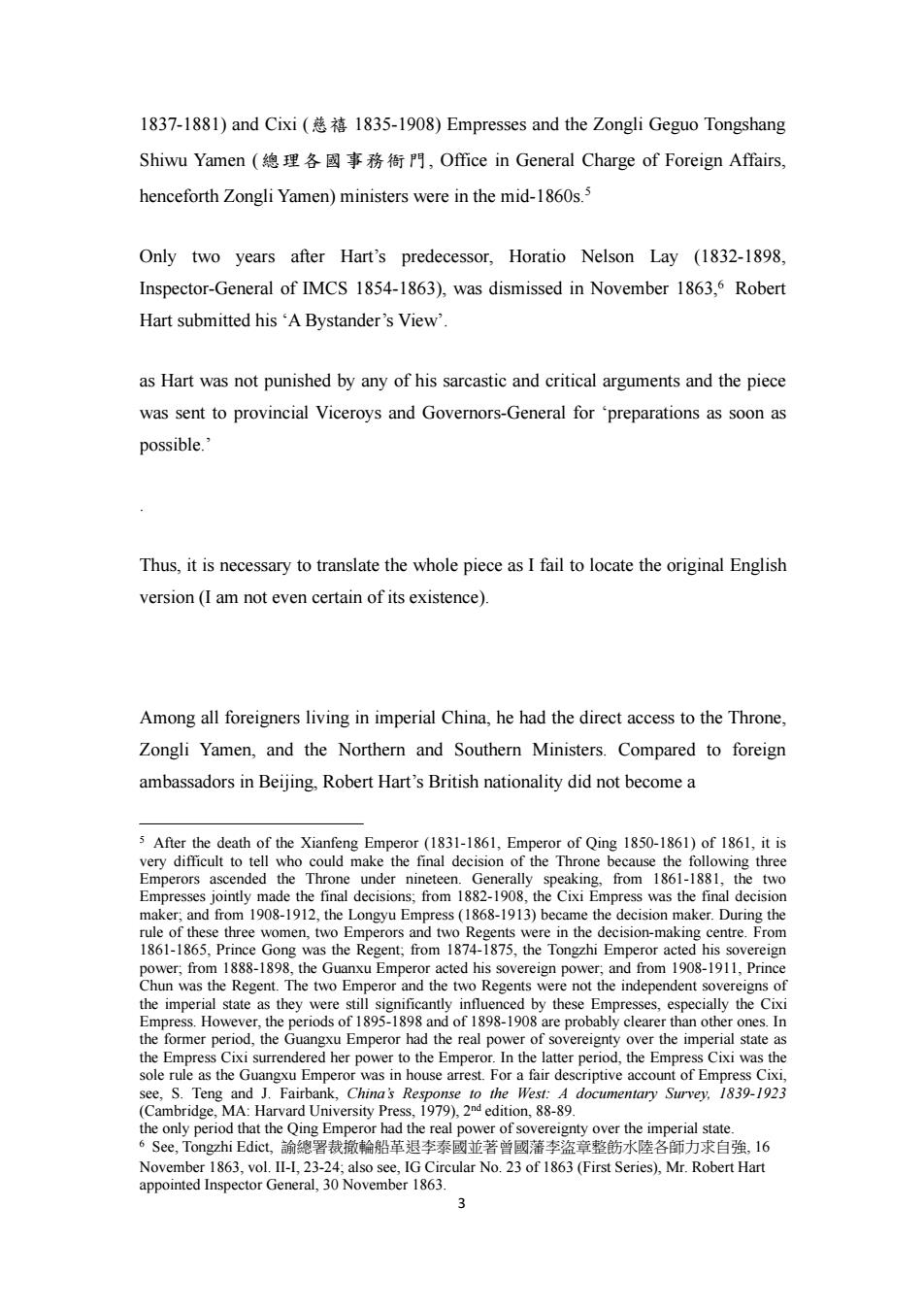正在加载图片...

1837-1881)and Cixi 1835-1908)Empresses and the Zongli Geguo Tongshang Shiwu Yamen(總理各國事務衙門,Office in General Charge of Foreign Affairs, henceforth Zongli Yamen)ministers were in the mid-1860s.5 Only two years after Hart's predecessor,Horatio Nelson Lay (1832-1898, Inspector-General of IMCS 1854-1863),was dismissed in November 1863,6 Robert Hart submitted his'A Bystander's View'. as Hart was not punished by any of his sarcastic and critical arguments and the piece was sent to provincial Viceroys and Governors-General for preparations as soon as possible.’ Thus,it is necessary to translate the whole piece as I fail to locate the original English version (I am not even certain of its existence). Among all foreigners living in imperial China,he had the direct access to the Throne, Zongli Yamen,and the Northern and Southern Ministers.Compared to foreign ambassadors in Beijing,Robert Hart's British nationality did not become a 5 After the death of the Xianfeng Emperor(1831-1861,Emperor of Qing 1850-1861)of 1861,it is very difficult to tell who could make the final decision of the Throne because the following three Emperors ascended the Throne under nineteen.Generally speaking,from 1861-1881,the two Empresses jointly made the final decisions;from 1882-1908,the Cixi Empress was the final decision maker;and from 1908-1912,the Longyu Empress(1868-1913)became the decision maker.During the rule of these three women,two Emperors and two Regents were in the decision-making centre.From 1861-1865,Prince Gong was the Regent;from 1874-1875,the Tongzhi Emperor acted his sovereign power;from 1888-1898,the Guanxu Emperor acted his sovereign power;and from 1908-1911,Prince Chun was the Regent.The two Emperor and the two Regents were not the independent sovereigns of the imperial state as they were still significantly influenced by these Empresses,especially the Cixi Empress.However,the periods of 1895-1898 and of 1898-1908 are probably clearer than other ones.In the former period,the Guangxu Emperor had the real power of sovereignty over the imperial state as the Empress Cixi surrendered her power to the Emperor.In the latter period,the Empress Cixi was the sole rule as the Guangxu Emperor was in house arrest.For a fair descriptive account of Empress Cixi, see,S.Teng and J.Fairbank,China's Response to the West:A documentary Survey.1839-1923 (Cambridge,MA:Harvard University Press,1979),2nd edition,88-89. the only period that the Qing Emperor had the real power of sovereignty over the imperial state. 6See,Tongzhi Edict,.諭總署裁撤輪船革退李泰國並著曾國藩李盗章整飭水陸各師力求自強,l6 November 1863,vol.II-I,23-24;also see,IG Circular No.23 of 1863(First Series),Mr.Robert Hart appointed Inspector General,30 November 1863. 33 1837-1881) and Cixi (慈禧 1835-1908) Empresses and the Zongli Geguo Tongshang Shiwu Yamen (總理各國事務衙門, Office in General Charge of Foreign Affairs, henceforth Zongli Yamen) ministers were in the mid-1860s.5 Only two years after Hart’s predecessor, Horatio Nelson Lay (1832-1898, Inspector-General of IMCS 1854-1863), was dismissed in November 1863,6 Robert Hart submitted his ‘A Bystander’s View’. as Hart was not punished by any of his sarcastic and critical arguments and the piece was sent to provincial Viceroys and Governors-General for ‘preparations as soon as possible.’ .Thus, it is necessary to translate the whole piece as I fail to locate the original English version (I am not even certain of its existence). Among all foreigners living in imperial China, he had the direct access to the Throne, Zongli Yamen, and the Northern and Southern Ministers. Compared to foreign ambassadors in Beijing, Robert Hart’s British nationality did not become a 5 After the death of the Xianfeng Emperor (1831-1861, Emperor of Qing 1850-1861) of 1861, it is very difficult to tell who could make the final decision of the Throne because the following three Emperors ascended the Throne under nineteen. Generally speaking, from 1861-1881, the two Empresses jointly made the final decisions; from 1882-1908, the Cixi Empress was the final decision maker; and from 1908-1912, the Longyu Empress (1868-1913) became the decision maker. During the rule of these three women, two Emperors and two Regents were in the decision-making centre. From 1861-1865, Prince Gong was the Regent; from 1874-1875, the Tongzhi Emperor acted his sovereign power; from 1888-1898, the Guanxu Emperor acted his sovereign power; and from 1908-1911, Prince Chun was the Regent. The two Emperor and the two Regents were not the independent sovereigns of the imperial state as they were still significantly influenced by these Empresses, especially the Cixi Empress. However, the periods of 1895-1898 and of 1898-1908 are probably clearer than other ones. In the former period, the Guangxu Emperor had the real power of sovereignty over the imperial state as the Empress Cixi surrendered her power to the Emperor. In the latter period, the Empress Cixi was the sole rule as the Guangxu Emperor was in house arrest. For a fair descriptive account of Empress Cixi, see, S. Teng and J. Fairbank, China’s Response to the West: A documentary Survey, 1839-1923 (Cambridge, MA: Harvard University Press, 1979), 2 nd edition, 88-89. the only period that the Qing Emperor had the real power of sovereignty over the imperial state. 6 See, Tongzhi Edict, 諭總署裁撤輪船革退李泰國並著曾國藩李盜章整飭水陸各師力求自強, 16 November 1863, vol. II-I, 23-24; also see, IG Circular No. 23 of 1863 (First Series), Mr. Robert Hart appointed Inspector General, 30 November 1863